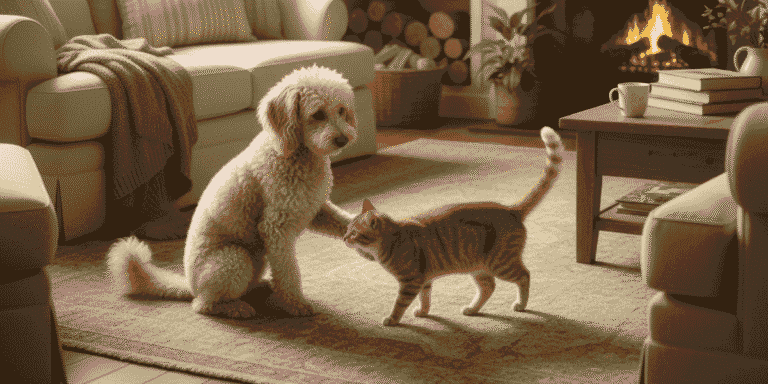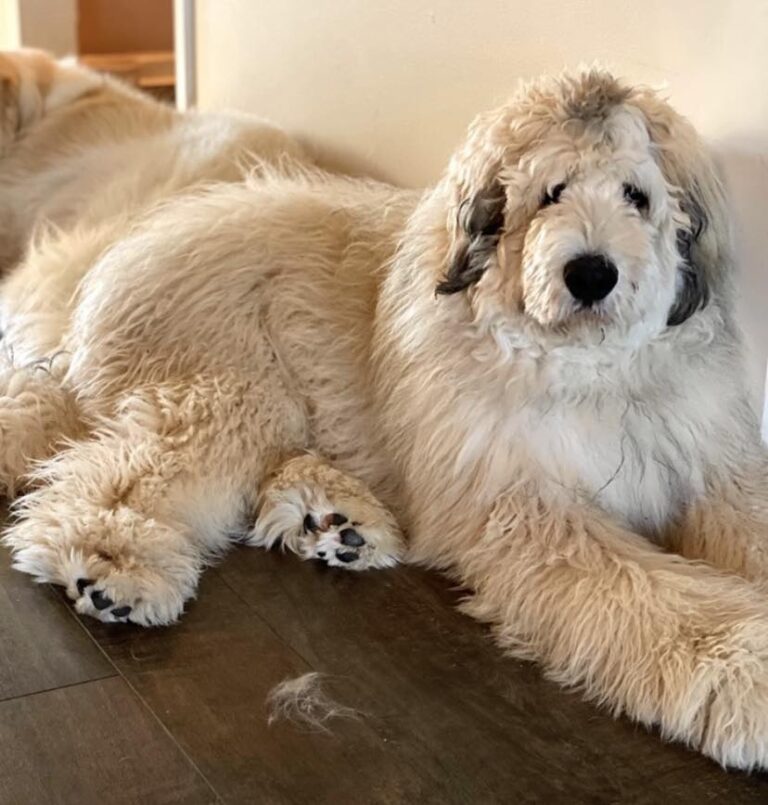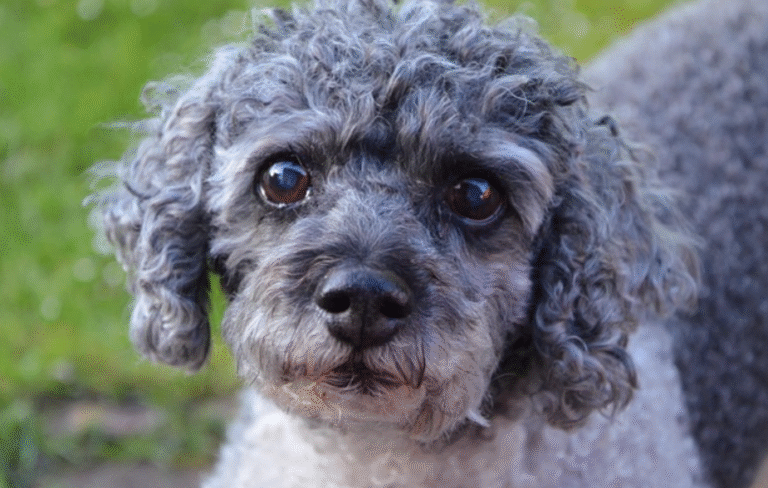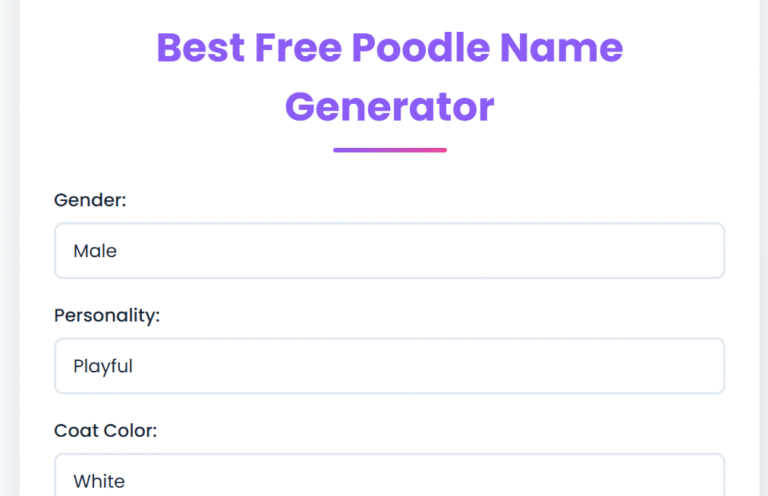Teacup poodles are among the smallest varieties of poodles, bred to weigh under 2.7 kilograms as adults. Famous for their tininess, curly coat, and spiritedness, they’re a perfect fit for small apartments.
Teacup poodles are known for their friendly disposition and intelligent behavior. Their care requirements, health, and characteristics are different from those of regular poodles.
The following entry discusses what to know before choosing one as a pet.
What Are They?
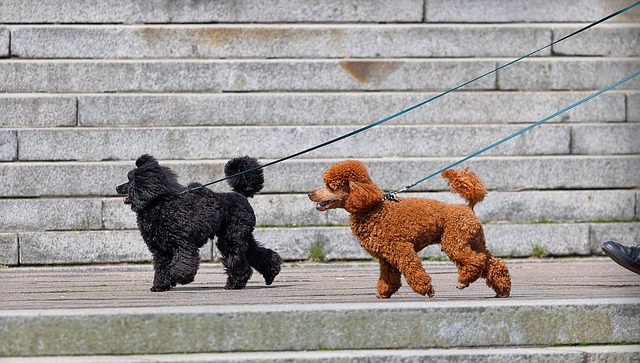
Teacup Poodles are the teeny tiny version of Poodles that are bred to remain below 23 cm and less than 2.7 kgs. They are like little teddy bears, with plush, curly coats and button eyes. It’s no wonder that millions of people reach for Teacup Poodles, particularly if they reside in apartments or are nomads.
We pick them for their pint-size appeal, allergy-friendly coats and loving personalities. Teacup” isn’t a formal designation; it simply designates any Poodle that’s smaller than a Toy. These petite pooches have won over the hearts of pet parents craving a pint-sized pal with a huge attitude.
1. The Distinction
Teacup Poodles are a type of Toy Poodle (they’re not considered a distinct breed by the AKC). The AKC only recognizes three Poodle sizes: Standard, Miniature, and Toy. Nearly ALL Teacup Poodles ARE actually registered as Toy Poodles, because they are still technically under Toy’s size limit, even if they’re smaller.
Their unofficial status influences how breeders treat these dogs. Although the majority of breeders include Teacup Poodles under Toy Poodles, some utilize the “Teacup” moniker to capitalize on the thirst for tinier in pets. This may alter the way dogs are bred and sold, and what owners can expect when pursuing a “Teacup” dog.
Responsible pet ownership is about being aware of the difference and respecting the breed’s boundaries.
2. Breeding Ethics
There are moral concerns associated with breeding Teacup Poodles. To get dogs this small, breeders tend to select the smallest Poodles in a litter and mate them. This can cause health issues such as brittle bones or organ complications.
It’s better to find breeders who prioritize the dog’s health over their size. Avoid back-yard breeders or puppy mills. These sellers usually care more about profit than they do about the animals. From such places, dogs could be more sick or have more issues.
Future owners should educate themselves on the breeder’s practices and inquire about health screenings. This step helps encourage responsible breeding and healthier animals.
3. Size Genetics
The miniature stature of Teacup Poodles is due to selective breeding, frequently among the littlest dogs per litter. Over time, this has resulted in low genetic variation, which can further elevate the dangers of hereditary illnesses. Certain health issues, like heart defects or dental problems, are more prevalent in smaller dogs.
Knowing the genetics behind these dogs is crucial for those considering bringing one home. Know their lineage and ask for their health records. It gives you more peace of mind.
4. Official Status
Teacup Poodles don’t exist as a breed. Because they are unrecognized, there are no established size, health, or breeding standards. Purchasers should select breeders who utilize best practices.
No one calls them Teacup Poodles, but they’re selling like hotcakes.
Health Reality

Teacup Poodles are incredibly small, but this means special health realities associated with being a tiny teacup poodle. Their small stature presents unique challenges, such as brittle bones and an increased risk of some diseases. These factors make routine health screenings and proactive care essential for these purebred poodles. Genetics, daily habits, and the environment all impact the quality and length of their lives.
Lifespan
Teacup Poodles usually live between 12 and 14 years.
How long a Teacup Poodle lives can be very much dependent on their genetics and upbringing. Dogs from responsible breeders who test for inherited health problems are less likely to have chronic conditions. On top of that, everyday habits such as a healthy diet, pure water and ample exercise give a teacup’s longevity odds a fighting chance.
Routine check ups at the vet can detect issues early, which is critical for senior pups encountering age-related health shifts like arthritis or vision loss. Detecting these changes early provides pet parents with the most options to address them.
Fragility
The tiny size of Teacup Poodles makes them susceptible to broken bones and joint injuries.
Soft treatment is a necessity with these dogs. A tumble from a bed or couch, or even rough-housing, can injure. Since they’re less than 2kg, their bones are fine and their joints, like the patella, are prone to luxation.
This means their kneecaps can pop out. Simple things such as toddlers, other animals or even narrow places can increase the likelihood of incidents. Making your home hazard-proof—ramps, gated off ledges, clutter-free floors—can reduce the risk of injury.
Common Ailments
- Hypoglycemia (low blood sugar)
- Legg-Calvé-Perthes disease (hip bone disorder)
- Luxating patella (knee cap slips)
- Dental crowding, gingivitis, and retained baby teeth
- Eye issues (cataracts, progressive retinal atrophy)
- Autoimmune disorders
- Von Willebrand’s disease (bleeding disorder)
Early detection of these problems is key. If your dog appears weak, is limping or exhibiting shifts in his appetite, rapid vet visits could indicate a speedy recovery.
Dental checks are particularly vital, as their petite jaws frequently cram teeth and prevent baby teeth from shedding. Responsible breeding assists reduce danger, so requesting wellness documents prior to taking on a teacup is shrewd.
Extra Care Needs
Sweaters or coats help in mild cold.
They may need food every two hours.
Watch for signs of pain.
No dog, including Teacup Poodles, is fully hypoallergenic.
Daily Commitment

Taking care of a Teacup Poodle requires a consistent, everyday commitment. These little mutts do best on firm routines and daily commitment. Below is a checklist outlining the main daily care needs:
- Offer balanced meals in small portions three to four times a day.
- Give 20–30 minutes of light exercise, primarily walks and indoor play.
- Brush their curly coat daily to prevent matting.
- Engage their mind with training, toys, and new experiences.
- Set aside time for social interaction and mental stimulation.
- Avoid leaving them alone for more than 4–6 hours.
- Check for signs of stress or health issues.
- Adhere to routine grooming, monthly at least, for coat and skin conditioning.
Consistent feeding, exercise and grooming regimens contribute to their health. Regular attention aids in their energy regulation, coat health, and establishes trust.
Teacup Poodles are fast learners and do great with established routines, so daily commitment is essential for a joyful, vibrant companion.
Nutrition
- Feed premium dry food for small breed pups, divided into 3 or 4 mini meals a day to accommodate their equally small tummies.
- Throw in some lean proteins such as chicken or fish, and stir in some cooked vegetables for equilibrium.
- Monitor their weight closely to prevent underfeeding or obesity – teacup poodles can gain or lose weight rapidly.
- Never feed them table scraps or foods that are high in fat, sugar or seasoning and ALWAYS offer fresh water.
A teacup poodle-specific diet fuels consistent energy and robust immunity, while regular vet visits provide input on special dietary needs for these tiny poodles’ unique health concerns.
Exercise
Short daily walks of around 20 minutes keeps them moving without over-exertion. Indoor playtime, such as fetch or basic games, injects activity and develops connections.
Teacup Poodles require mental exercise as well as physical. Stimulate their keen minds with interactive toys and puzzles. Regular exercise combined with rest wards off burnout, nourishes your body and your spirits.
Walks should be short. Don’t wrestle. Be sure exercise is appropriate for their size and age.
Grooming
Daily maintenance is crucial for a Teacup Poodle’s upkeep. Their curly coat mats quickly, so daily brushing is a requirement. Cuts such as the puppy or teddy bear clip maintain fur tidy and more manageable.
Monthly professional grooming fees can run anywhere from $60 to $100. Putting off this basic care results in mats, skin problems and pain.
Daily brushing reduces shedding and keeps every groom smoother.
Socialization
Begin socialization early. Take them to new locations, new people, dogs, and cats. Good experiences develop faith and a quiet gracious spirit.
As you know, puppy classes assist with socialization. Short playdates help too. Routine social time prevents fear or anxiety later on.
True Temperament

Teacup Poodles are known for being intelligent, sociable, and faithful. They’re tiny, with a big heart and they live to be around humans. These smart canines are quick to learn, able to comprehend up to 300 words, which makes them surprisingly easy to train and ‘talk’ to.
They seek love and tend to attach themselves tightly to their families, savoring play sessions, snuggles and just being in close proximity to their humans. Due to their dimensions, tender loving care is a requirement.
The Myth
One common misconception is that Teacup Poodles are yappy or mean all the time. That concept is largely a stereotype along with it. Most of these dogs just yap and misbehave when they’re afraid or weren’t properly socialized as puppies.
Most of the ‘bad’ behavior in Teacup Poodles stems from fear, not a spiteful disposition. If a dog hasn’t been well socialized with people or exposed to new environments, it might bark more or be jumpy.
Training and patience make them feel secure and reduce barking or biting. Soft, consistent habits and commendation go further than strong punishment.
The Reality
In fact, Teacup Poodles are affectionate, devoted and frequently desire little other than to satisfy their households. They go where their owners go – from room to room – even curling up close.
These dogs do well with positive reinforcement. Rewards, explicit directions and positive feedback allow them to learn quickly. Teacup Poodles are intelligent and tend to learn new tricks or orders rapidly.
They adore games that engage their minds, such as treat puzzles or hide-and-seek. With their incisive intellects, they frequently know what they should be doing and can become bored if under-challenged.
Keeping them occupied with enjoyable drill work or play helps direct their energy positively. Their devotion occasionally manifests as defensiveness. Most will bark and warn their owners to new people or noises.
This instinct can be beneficial but may require some direction, so they don’t yap at every minor sound. A happy, peaceful home goes a long way to reining in their guardian mode and instead allowing them to feel safe.
Affection and Attachment
Teacup Poodles desire to be around their family as a lot of them as possible. This tight connection causes them to occasionally have difficulty on their own. Separation anxiety may manifest itself in barking, chewing, or other undesirable behaviors.
These pups thrive on attention, play time and affection. A little training and keeping them at your side as much as possible will make them happy and well-behaved.
Even small, daily rituals, like taking a walk or having a cuddle before bed, have a big impact. Most problems can be solved with patience and understanding.
Responsible Adoption

Responsible adoption is about more than just adopting a Teacup Poodle. It carries with it a responsibility to care for the dog’s well-being, joy, and security for years ahead. This breed requires gentle handling, frequent grooming and cautious attention to its diminutive size and potential health concerns.
Your decision of where and how to adopt has a significant impact on the dog’s long-term well-being.
Breeder Vetting
A great place to start is by checking out breeders. Not all breeders are safe or humane. Others care only about the bottom line, selecting decisions that can harm the dogs.
Inquire about screenings for things like luxating patellas or von Willebrand’s. Give puppies tons of human time early! Visit the breeder’s setup – if you can.
Search for clean spaces, healthy puppies and no abuse. Request names of previous purchasers. Chatting with them can reveal if the breeder maintains high standards or not.
Adoption Process
There are a few steps to adopt a Teacup Poodle. Most breeders or rescues request an application. This helps them understand if your household is suitable for such a tiny pooch.
Anticipate providing proof of your accommodation and lifestyle query. Some organizations do home visits or video calls. They want to visit where the dog will reside and inspect the safety.
They may inquire about how you intend to feed, groom and care for the dog. These measures assist make a good match among the proper pet dog and the right residence.
Taking a Teacup Poodle home is not a flash in the pan thing. These pups have a long life ahead. Owners should be prepared for the day-to-day maintenance, such as feeding, walks, and play.
It’s important to stay on top of vet visits and grooming. Adopting is a significant decision, it’s not just about drooling over the breed’s appearance. The dog’s needs and your life have to align for a joyful home.
Price Trends
| Factor | Influence on Price | Typical Range (USD) |
|---|---|---|
| Size & Rarity | Smaller, rarer = higher | $1,200–$5,000 |
| Breeder Reputation | Reputable = higher | $2,000–$6,000 |
| Health Testing | Tested pups = higher | $2,500–$7,000 |
| Location | Urban = higher | $1,800–$5,500 |
The cost of a Teacup Poodle varies quite a bit. It’s higher for uncommon colors or very small sizes. Reputable breeders ask more, but usually deliver healthy pups.
Health checks and puppy care up the price. Urban buyers might shell out more. Plan for stuff like food, grooming, toys and vet visits.
These costs can accumulate over the dog’s life. It’s not only the initial payment—think years of care.
Commitment and Lifestyle
Consider first your own life and where a Teacup Poodle falls in. Others adopt this breed without understanding its care requirements.
If you’re a frequent traveler or a long-hour warrior, it might not be a good fit. A loving home, stable care–it makes all the difference.
A Personal View

Having a teacup poodle can be a blessing and a curse. Their compactness makes them suit city home or flat living, where space is a commodity. For those who are at the office all day, the breed’s small exercise requirements may make them appear to be an attractive choice.
Still, while they don’t require long walks, they demand time and attention when their owners return home. They feed on attention and can become bonded with their humans, craving hugs and frisbee after a lonely day on the couch.
Teacup poodles are intelligent, faithful and attentive. This is to say, they frequently pick up magic and juggling quick. Other owners report that their teacup poodle becomes a tiny but loyal shadow, ever at their side and always willing.
Their sense of humor is contagious and their genuine connection with humans could usher in an era of true joy. Other owners recount stories of their dogs following them from room to room or ending the day curled up in their lap. These times are satisfying for individuals who desire a best pal.
This close bond means teacup poodles may not fare well if left alone for long stretches and depend upon their owners for both affection and comfort.
Raising a teacup poodle is about patience and persistence. Their petite little frames can be delicate, so even the simple act of grooming or picking them up requires gentleness. Daily brushing is a necessity because their curly coat has a tendency to mat if left unattended.
They report that their low-shedding hair is an advantage, particularly for allergy sufferers. Still, the brushing and groomer visits are a true reality with a teacup poodle. Patience counts in training, as well. They’re fast learners, but can be pig-headed, so a patient, gentle approach is best.
Just like owners, pets appreciate their share of praise and treats – it builds trust and good habits.
To think like a teacup poodle is to think about your life first. Their requirements are mini in some respects and huge in others. They can be prone to health problems connected with their size and breeding, so bracing for vet visits and care expenses is crucial.
For flat dwellers or those with hectic lifestyles, the breed’s diminutive stature and minimal exercise requirements are a bonus. Still, they require daily hours, constant attention and a light hand.
Conclusion
Teacup poodles attract a lot of attention with their appearance and stature. They require actual maintenance on a daily basis. Teacup poodles require calm hands, patience and a huge heart. Health checks, play and gentle walks keep them bright and happy. Real life with a teacup poodle may be adorable, but it can translate to labor and expense.

Good breeders put the dogs first, not just the price tag. For anyone eager to have a teacup poodle, educate yourself, inquire with integrity and consider the long-term reality. To discover whether this breed fits your lifestyle consult with vets or rescue organizations. Solid info can assist you in making the best decision for you and the pup.
Frequently Asked Questions
What is a teacup poodle?
A tiny teacup poodle is an extremely small poodle breed, known for being under 2.7 kg in adulthood and famous for their playful, loving disposition.
Are teacup poodles healthy dogs?
Teacup poodles have health issues. Their tiny stature predisposes them to heart problems, brittle bones and hypoglycemia. Regular vet checkups are important.
How long do teacup poodles live?
Teacup poodles, especially when cared for properly, can live about 12 to 15 years; however, their small size may lead to health issues that could shorten their lifespan.
Do teacup poodles need a lot of daily care?
Yep, tiny teacup poodles require daily care. These small toy poodles need to be delicately cared for, fed routinely, exercised, and groomed to ensure their well-being and prevent behavioral problems.
What is the temperament of a teacup poodle?
Teacup poodles are charming, smart, and loving companion pups. This tiny teacup poodle breed fits in nicely with families or singles, especially with early socialization.
Are teacup poodles good for families with children?
Teacup poodles, known for their small size, are a dime a dozen. If you have young kids, be extra cautious because roughhousing could break these fragile teacup poodles. Monitoring is constantly required.
How can I find a responsible teacup poodle breeder?
Opt for those who breed for health and not size. Request health certificates and if you can, visit the breeding location. Good breeders love their dogs!

